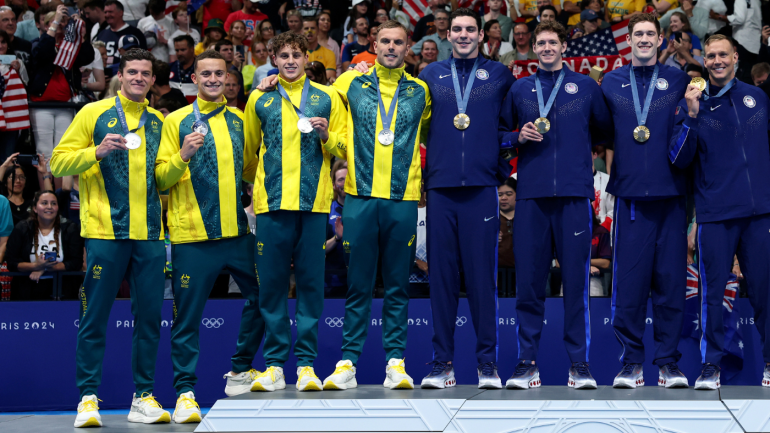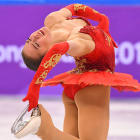
Why are we drawn to the Olympics? There are many reasons, but I'd argue the biggest above all others is the chance to witness uncommon athletic dominance in uncommon sports. We tune in to watch events and competitions we otherwise don't pay attention to, except for a two-week period every four years, to be riveted by once-in-a-generation-type talent.
That's the No. 1 reason. And a close second would be genuine rivalries, when they happen to emerge.
These Summer Games are giving us both, and they're specifically going to deliver in men's and women's swimming every day over the next week.
We wanted a splash to open Saturday in the pool in Paris. That's exactly what we got.
First, the highly anticipated women's 400-meter freestyle final, which went as planned -- but that's not to suggest it lacked spectacle or drama. As expected, the gold (again) belongs to the astounding Aussie, 23-year-old Ariarne Titmus, who continued her four-year unbeaten streak in the event by cruising past Canadian silver medalist Summer McIntosh and the greatest female American swimmer of all time, Katie Ledecky, who earned bronze.
Titmus beat Ledecky on Saturday, just as she did three years ago in Tokyo, touching the wall in 3:57.49, which didn't come close to her world record of 3:55.38. In claiming the first swimming gold of these Games, Titmus also became the second woman to win the gold twice in the 400 meters. (Martha Norelius did it for the United States in 1924 and '28.)
McIntosh (a bona fide rising star at just 17 years old) swam 3:58.37 and remained a few strokes ahead of Ledecky the entire race. Ledecky's 4:00.86 swim was good enough to hold off New Zealand's Erika Fairweather, who touched fourth in 4:01.12 inside La Défense Arena in Nanterre, France.
With that, the United States vs. Australia 2024 pool o' war began. Titmus' clear-cut victory was the first result of these games that reestablished a rivalry that will hover over the next week of the Games. In recent years and Olympics, the Australians have been closing the gap on the United States, which for decades enjoyed being the deepest and fastest nation in the pool.
That may prove to be true again in 2024, but the gap has all but closed and Australia has a chance to be the champions of the water in the City of Light.
This possibility was reinforced less than 40 minutes after Titmus' gold, when the Aussies outpaced the U.S. in the women's 4x100 freestyle relay. Australia took its second gold in the water with a time of 3:28.92 -- its fourth straight gold in this Olympic event. The U.S. was in second (3:30.20), narrowly out-touching China (3:30.30).
How ridiculous was the women's 4x100? Australia's time on Saturday set an Olympic record. The United States' silver-taking swim set an American record.
The American quartet of Kate Douglass, Gretchen Walsh, Torri Huske and Simone Manuel got it done for the red, white and blue. Manuel, specifically, upped the U.S.-Aussie stakes by swimming an incredible anchor leg; the Americans were behind the Chinese for the final stage when Manuel dove in and finished with a 52.61 split.
The Australians had a shot to go three for three. But then the American men showed up and dominated in the 4x100 freestyle relay to cap the night. The foursome of Jack Alexy, Chris Guiliano, Hunter Armstrong and Caleb Dressel won -- with some breathing room, finishing with an aggregate of 3:09.29 -- over Australia, who took silver (3:10.35). The difference was evident: Alexy had the best leg, swimming in 21.70 seconds in his first 50 meters and finishing with 47.33, the best of the four Americans.
DOMINANCE 💪🥇@TeamUSA | #Paris2024
— USA Swimming (@USASwimming) July 27, 2024
pic.twitter.com/W13F8lsVRm
It was the first gold for Team USA -- in any event -- in the first 24 hours of these Games. A thrilling race and a dominant reminder of how good the United States can be in the pool. It often taps into another level when it comes to relays. The gold medal push in the 4x100 on the men's side was good not just for the race vs. the Australians, but for the collective morale for Team USA Swimming over the next week. For Dressel, an absurd trend continued.
He's now taken eight Olympic medals in his career, every one of them gold.
Overall, a tremendous opening day of swimming in Paris. Immediate high stakes and the best swimmers in the world living up to the hype.
Will this be the year that swimming dominance is claimed from an ocean away, across the Pacific? It's now a real question. Because of the nature of this sport, we'll get Titmus' commanding stroke a few more times, just as we will Ledecky, who just took her 11th medal -- and she's expected to add multiple more in the coming days, likely golds in the 800 and 1500. The 400 from Saturday is the bonus -- and not what Ledecky is known for. It speaks to her greatness that she's by far the best 800 and 1500 swimmer in history, yet she also owns a gold in the 400, from back in 2016 at Rio.
The rivalry has been real for years now, but after Saturday, it's officially on. For as great as it is to dominate a sport, the better reward comes when beating a true foil. In an Olympics packed with storylines, the best of them all might be coming in the pool almost every day for the next week.















